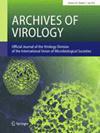Effect of trypsin digestion on the integrity and antigenic epitopes of GII.6 norovirus virus-like particles
Abstract
Trypsin digestion of the GII.6 norovirus (NoV) major capsid protein VP1 promotes its binding to histo-blood group antigens (HBGAs), which are believed to be co-receptors for NoVs. In our previous study, we found that trypsin digestion led to the disassembly of GII.6 NoV virus-like particles (VLPs). In this study, we investigated the effect of trypsin digestion on the integrity of GII.6 NoV VLPs using a modified purification approach and determined the N- and C-terminal residues of the fragments produced by digestion, using peptide mass fingerprinting. We also characterized the antigenic epitopes that were affected by trypsin digestion using monoclonal antibodies (mAbs). Our results indicated that GII.6 VLPs remained intact even after complete cleavage at the P1-1/P2 junction. Most of the mAbs in supernatants of hybridoma cell clones showed reduced binding to trypsin-digested GII.6 VLPs. Eight mAbs that showed reduced binding to digested GII.6 VP1 were produced, and these were found primarily to recognize residues located in the P domain. Our results provide evidence of flexibility and extensive morphological changes in the antigenic epitope of GII.6 VLPs after trypsin digestion. It remains to be investigated whether this phenomenon also occurs in virions.

 求助内容:
求助内容: 应助结果提醒方式:
应助结果提醒方式:


